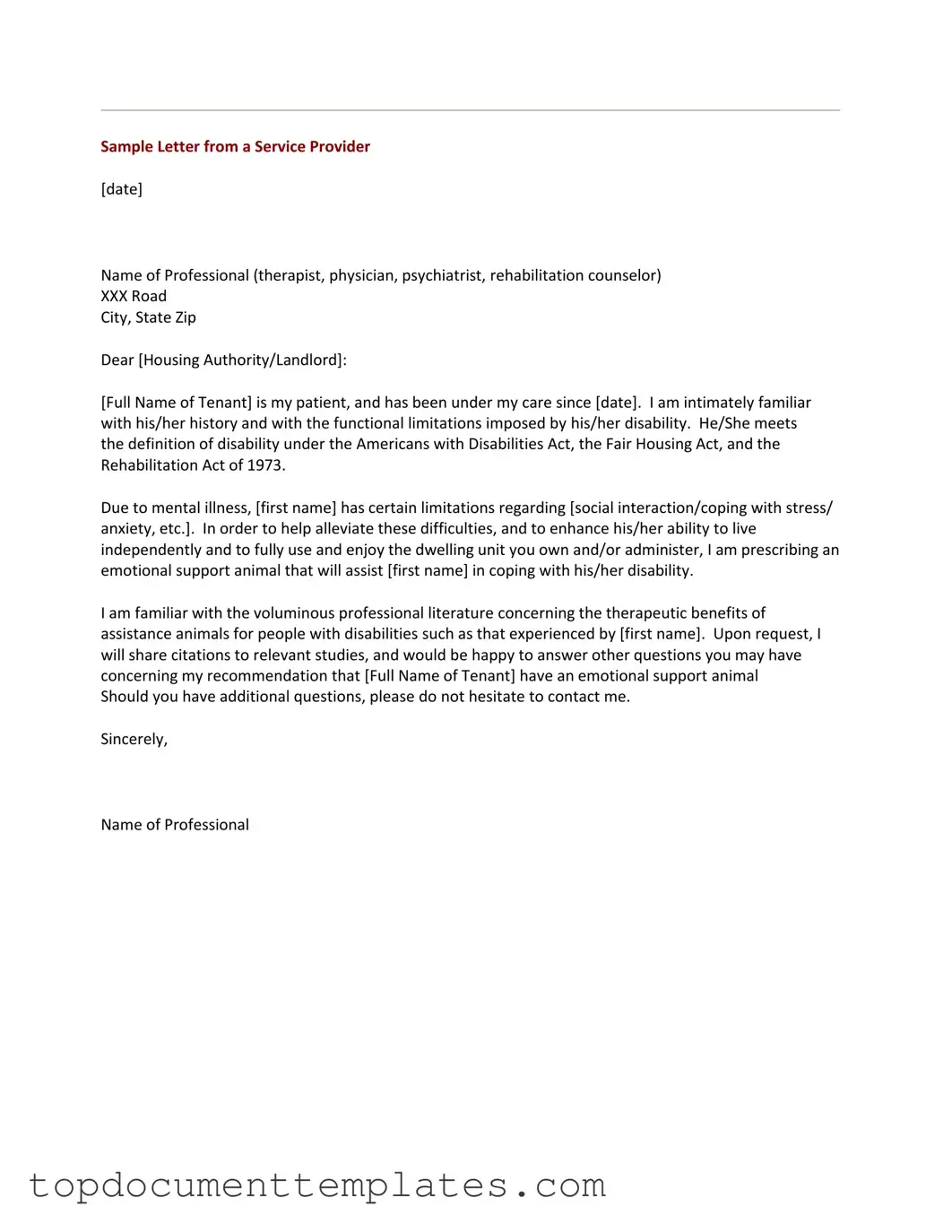Blank Emotional Support Animal Letter PDF Form
The Emotional Support Animal (ESA) Letter form serves as a crucial document for individuals seeking to validate their need for an emotional support animal. This form typically requires specific information, including the individual's name, the type of animal, and a licensed mental health professional's endorsement. It is important to note that this letter is not merely a recommendation; it plays a significant role in allowing individuals to access certain housing accommodations and travel provisions under the Fair Housing Act and the Air Carrier Access Act. To be effective, the letter must be on official letterhead and include the professional's license number, along with a signature. The content of the letter should clearly articulate the individual’s mental health condition and the therapeutic benefits provided by the animal. Moreover, the ESA Letter form is distinct from a service animal certification, as it emphasizes emotional support rather than task-oriented assistance. Understanding the nuances of this form is essential for both individuals seeking support and the professionals who provide it.
Similar forms
-
Service Animal Letter: This document certifies that an individual requires a service animal for a disability. Like the Emotional Support Animal Letter, it is issued by a licensed professional and provides necessary legal protection under the Americans with Disabilities Act (ADA).
-
Therapy Animal Letter: Similar to the Emotional Support Animal Letter, this document indicates that an animal provides therapeutic benefits to an individual. It is often used in settings like hospitals or nursing homes, but it does not carry the same legal rights as an emotional support animal.
-
Pet Deposit Waiver: This document may accompany an Emotional Support Animal Letter, allowing tenants to keep their animal without additional pet fees. It serves to clarify the legal standing of the animal in housing situations.
-
Disability Verification Letter: A healthcare provider issues this letter to confirm a person's disability. It shares similarities with the Emotional Support Animal Letter in that it must come from a qualified professional and can help in securing necessary accommodations.
-
Housing Accommodation Request: This is a formal request submitted to landlords or housing authorities, often supported by an Emotional Support Animal Letter. It details the need for specific accommodations due to a disability.
-
Medical Necessity Letter: This letter outlines the medical need for a specific treatment or support, including emotional support animals. It is similar in purpose, as both documents aim to provide justification for the presence of an animal.
-
Letter of Recommendation for an Animal: This document is written by a mental health professional to recommend a specific animal for emotional support. It serves a similar purpose in affirming the benefits of having an animal for mental health.
-
Pet Therapy Program Documentation: This document outlines participation in a pet therapy program, similar to the Emotional Support Animal Letter in that it recognizes the therapeutic role of animals in mental health care.
-
Veterinary Health Certificate: While not directly related to emotional support, this certificate verifies that an animal is healthy and up-to-date on vaccinations. It complements the Emotional Support Animal Letter by ensuring the animal is fit for public interaction.
Guidelines on Writing Emotional Support Animal Letter
Filling out the Emotional Support Animal Letter form is a straightforward process. By following these steps, you can ensure that all necessary information is provided accurately. This will help you get the support you need for your emotional well-being.
- Begin by gathering your personal information, including your full name, address, and contact details.
- Next, provide information about your emotional support animal, such as its name, breed, and age.
- Indicate the type of support you require from your animal. Be specific about how it helps you.
- Fill out any required medical history or background information that may be relevant to your situation.
- Include the name and contact information of your mental health professional, if applicable.
- Review all the information for accuracy and completeness.
- Sign and date the form where indicated.
- Submit the completed form according to the provided instructions.
Once you have filled out the form, make sure to keep a copy for your records. This can be useful for future reference or if any questions arise.
Form Data
| Fact Name | Description |
|---|---|
| Definition | An Emotional Support Animal (ESA) letter is a document from a licensed mental health professional that states an individual requires an animal for emotional support. |
| Legal Status | Under the Fair Housing Act, individuals with ESAs are entitled to reasonable accommodations in housing situations. |
| State-Specific Forms | Some states have specific requirements for ESA letters, such as California's Civil Code Section 54.2, which outlines the rights of individuals with emotional support animals. |
| Validity | For an ESA letter to be valid, it must be written on the professional's letterhead and include their license number, date, and signature. |
| Duration | ESA letters typically do not have a fixed expiration date, but it is advisable to renew them annually to ensure continued support. |
Other PDF Documents
Florida Family Law Financial Affidavit Short Form - Judges often use this document as a primary resource for making financial decisions.
Sch C - This form typically includes details like sales revenue, cost of goods sold, and operating expenses.
What Is an Abn in Healthcare - ABN usage is critical for providers aiming to remain compliant with Medicare guidelines.
